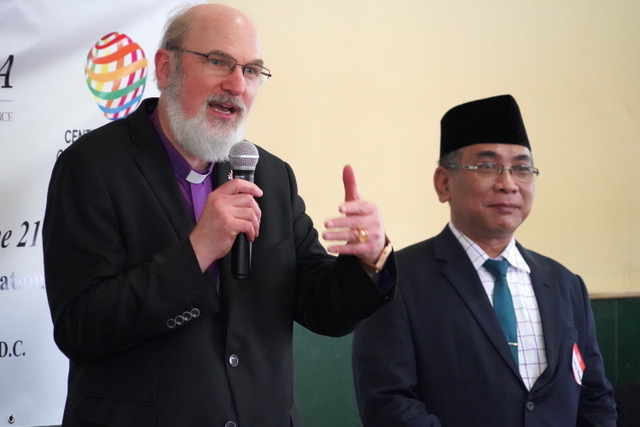
In a first, this year’s G20 Summit will include religions as “part of solution” to global crises, discussing how the world’s major religions could play a role in tackling the pressing global concerns in a meaningful way.
The G20 or Group of Twenty is an intergovernmental forum comprising 19 countries and the European Union (EU). It works to address major issues related to the global economy, such as international financial stability, climate change mitigation, and sustainable development.
As the body meets from November 15 to 16 in Indonesia this year, the summit, for the first time ever, includes an official main that will see global religious leaders collaborate to ensure religion’s role in addressing global challenges, including climate change, social justice, poverty, debt, and gender, race as well as ethnic discrimination.
Held in the most populous Muslim-majority nation, the G20 Religion Forum (R20) in Bali from 2-3 Nov will mobilise global leaders to help ensure that religion functions as a genuine and dynamic source of solutions, rather than problems, in the 21st century.
Its key objectives will include preventing the weaponisation of identity, curtailing the spread of communal hatred, safeguarding human beings from violence and suffering precipitated by conflict, encouraging honest and realistic conversations within and between religious communities and infusing geopolitical as well as economic power structures with moral and spiritual values.
The secretary general of the Muslim World League was earlier this year chosen as a co-chair of the summit to be adopted within the work of G20 by Indonesia’s Nahdlatul Ulama (NU) — the largest Muslim organisation in the world.
The NU represents 120 million moderate Muslims, over 40% of Indonesia’s population. The general chairman of its central board, Yahya Staquf, the driving force behind R20, has a record of challenging fellow believers over the need to re-contextualise the teachings of orthodox, authoritative Islam.
Change has already been achieved: in 2019, NU rejected the legal category of infidel (kafir) within Islamic law. It also endorsed the concept of a nation state, ruling that Muslims have no religious obligation to establish a caliphate. Also in 2017, Indonesia’s Supreme Court ruled that all religious groups should be treated equally before the law; failure to do so would be “unconstitutional”. Underpinning the Indonesian Constitution are the five principles, or “Pancasila”, and the nation’s motto “Unity in diversity,” both of which have come under pressure recently in the multi-cultural archipelago.
Indonesia’s President Joko Widodo will open the R20.
While acknowledging Indonesia’s own challenges, the NU and the Center for Shared Civilizational Values (R20’s Secretariat) invited the Mecca-based Muslim World League Secretary General Shaykh Muhammad bin Abdul Karim al-Issa to co-chair the summit, so as to engage with the wider world of Sunni Islam. In recent years, the Muslim World League has increasingly focused its public outreach on religious moderation.
The NU has developed cooperation with not only the Muslim World League, but also the global Catholic Church and with one of the world’s largest Christian networks, the Protestant World Evangelical Alliance, representing 600 million people in 143 countries. Its secretary general, Prof Thomas Schirrmacher from Germany, will attend R20 in person. The WEA has co-operated with the NU since 2019, including a successful effort to prevent the introduction of the Sharia law in The Gambia, West Africa.
Africa’s most populous nation will be represented by Archbishop Henry Ndukuba, Primate of the Anglican Church of Nigeria who will address the R20 opening session. With some 25 million adherents, his Church accounts for at least one in four global active Anglicans.
The Catholic Bishop of Sokoto in northern Nigeria, Matthew Kukah, will also speak, as will Bashar Warda, Archbishop of the Chaldean Catholic Church in Erbil, Iraq.
Former EU Special Envoy on Freedom of Religion or Belief outside the EU, Jan Figel, who played a key role in obtaining freedom for Asia Bibi, a Christian woman who was released nearly a decade after her arrest in Pakistan on false charges of blasphemy, is also a confirmed participant.
NU leaders represent the most theologically potent and operationally effective actors promoting religious liberty in the Islamic world today, leveraging the unique strength of Indonesia’s indigenous, pluralistic and tolerant understanding and practice of Islam (which dates back to 16th century Java), to promote religious freedom for all.
“I regard the work of Humanitarian Islam and the movement for Shared Civilizational Values as one of the most path-breaking and important developments in world politics and cross-civilisational ethics in our generation. No event that I know of is more timely, urgent, or well-conceived,” observes Robert Hefner, a leading scholar of global Islam at Boston University and president of the American Institute for Indonesian Studies. Professor Hefner will also participate in the R20.
The R20 leaders stress that the existing G20 Interfaith Forum emphasises how religions can help achieve the 2030 Sustainable Development Goals.
India and Brazil will, in succession, hold the G20 presidency in 2023 and 2024. India has the world’s largest Hindu population (1.1 billion) and Brazil, the second-largest Christian population (194 million). As such, an ongoing R20 is positioned to provide a seat at the G20 table for the 84% of citizens globally who say religion is important or very important to them (Pew Research 2016). Hundreds of millions of these people live in the Global South, in nations with no official presence at the G20.